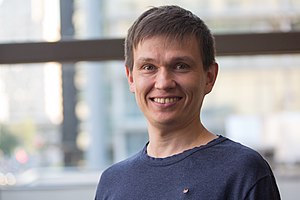Wikipedia:Wikipedia Signpost/2018-08-30/Interview
2018 Wikimedian of the Year, Farkhad Fatkullin
In the closing ceremony of this year's Wikimania, held in Cape Town, Wikipedia founder Jimmy Wales announced Farkhad Fatkullin (User:Frhdkazan) as the Wikimedian of the Year for 2018. Fatkullin was selected for his efforts in support of the minority language communities in Russia. Wales said that "Farkhad is energetically community organizing among Russia's minority languages communities, going far and wide beyond his native Tatar. He is also fluent in English, a fact that has established a bridge between those communities and the wider movement after years of isolation. He is community-minded, helpful, friendly, and dedicated to both Wikipedia's mission and to diversity."
Fatkullin joined the Wikimedia movement in 2009, when he "fell in love with Tatar Wikipedia", the small yet diverse encyclopedia that he goes to whenever he needs to get informed about any topic. Since 2015, Fatkullin has been actively contributing to Wikipedias in the languages of Russia project, aiming at supporting Wikipedia in those languages. The Signpost interviewed him about his work and views of Wikipedia. (Introduction adapted from the Wikimedia blog post.)
- How did you first become involved in Wikimedia?
- I greatly benefited from Wikipedia's inter-language links already in the pre-Wikidata age. Then, I discovered that I can actually edit. Then, I found Wikipedia in Tatar (my mother tongue). Then, I discovered the impact Wiki-editing has for the development of both the language and the culture. Then, I didn't want to stop and since 2015 I'm actively involved in many Wikimedia projects, not being limited to Wikipedia or even on-Wiki activities.
- What is the hardest challenge you've been presented with in your time?
- Learning to say "Wait! I might need to change my mind and the approach I am using even if I seem to be on the right both literally and in principle". Being a member of a small wiki, I had to balance my desire to promote the principles and five pillars with the need to help community development (Wikipedia is a community).
- What changes would you like to see happening on Wikimedia?
- Any changes happen on Wikimedia only when someone starts showing an example and this approach grows to win the heads and hearts of the active Wikizens. So each one of us is in charge of the change we want to see aboard. I want to see more such captains.
- What advice would you have for starting editors?
- As in everything, one only learns by doing. Whenever one grows experienced, he or she usually smiles at the mistakes that were made along the way. So we better enjoy getting it wrong, not taking anything too seriously. The community will eventually get things right!
- What is, in your opinion, the best way to deal with disagreeable editors?
- To begin with, editors matter. I am lucky not to be contributing into English, Russian, or any other high-traffic Wiki where disputes about the truth and lack of justice might get out of hand. In smaller Wikis, we can't afford to scold away people who are interested and ready to contribute in our languages. In this sense, "Wikipedia does not need you" doesn't apply to our world in its entirety, as growing each respective language's user base is a balancing act. "Don't feed the trolls" is good advice, though.
- How do you see Wikimedia, and the project as a whole, developing in the near future? The distant future?
- We are safe, so long as we are guided by the Vision and Purpose. Russia's public doesn't know what the Wikimedia movement is and what the principles and nature of its projects are, even though Wikipedia is actively used in our country as well. I am currently concentrating my efforts on communicating the benefits of active inclusion of these in education, GLAM, and other activities under the assumption that the more people see the benefit of participation in collaborative free knowledge creation and promotion projects, the truer we are going to be to our vision, mission, and values—and the better we are going to serve our Purpose.Imagine a world in which every single human being is a Wikimedian. That's my commitment!




Discuss this story